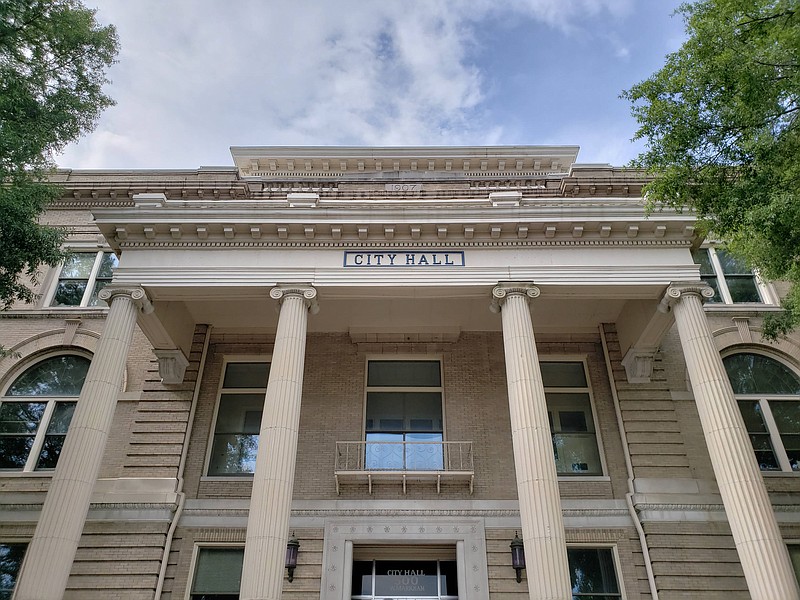An opposition committee with Little Rock's vice mayor on its leadership team has formed in the run-up to the Sept. 14 citywide referendum on a sales-tax increase.
The statement of organization for a new legislative question committee called "Responsible Taxation for Little Rock" was filed Tuesday with the Arkansas Ethics Commission.
Vice Mayor Lance Hines, the Ward 5 representative on the Little Rock Board of Directors and a vocal critic of Mayor Frank Scott Jr.'s "Rebuild the Rock" sales-tax package, is serving as one of the group's directors.
In addition to Hines, the three other committee directors listed on the statement of organization are Ray Dillon, Frank Lawrence and John Parke.
Dillon served as president and chief executive officer of a natural-resources company, Deltic Timber Corp., until 2016. Lawrence is chief executive officer of Little Rock Athletic Centers, according to his LinkedIn profile.
Since 2015, Parke has served as director of the Arkansas Department of Human Services' Payment Integrity Unit, a division tasked with watching out for instances of Medicaid waste.
At the time of his appointment, Parke served as treasurer of the state Republican Party and co-owner alongside his wife of a women's clothing store called Beyond Cotton, the Arkansas Democrat-Gazette reported at the time.
In a phone interview Friday, Hines said people in the community are opposed to the tax increase. He raised concerns about the timing of the tax as it relates to price inflation.
Additionally, Hines suggested that he was in a position to take the lead on efforts to oppose it.
Hines said he objected to the way the sales-tax package was approved by the Board of Directors, describing the process as one made up of special-called meetings and "last-minute-type stuff to try to get it done without any real public conversation about it."
Referring to the committee's name, Hines said "we're not opposed to responsible taxation."
"And this sales-tax initiative just doesn't meet the smell test for being responsible or doing what it says it's going to do for the city of Little Rock," he added.
The 1 percentage-point sales-tax increase would take Little Rock's overall local rate to 9.625% when accounting for state and county taxes. The increase would take effect in January if voters give approval.
Beginning in late March, Scott pushed publicly for board approval of the special election required to enact the tax increase. The proposal underwent a series of changes -- including the addition of a Dec. 31, 2031, sunset date -- before board members finally voted 6-3-1 in June to call the special election.
Hines was one of the "no" votes along with at-large City Director Joan Adcock and Ward 6 City Director Doris Wright. Ward 2 City Director Ken Richardson voted "present."
An estimated $530 million in new revenue generated over the lifetime of the sales-tax increase would fund park improvements, early-childhood education, additions to the Little Rock Zoo, community-oriented policing initiatives, infrastructure repairs, city vehicle replacement and more.
With the board vote to call the special election behind him, on July 22, Scott and several of his allies kicked off the campaign for the sales-tax increase with an event held at the Dunbar Community Center.
Co-chairpersons of the "Rebuild the Rock" campaign committee are Pamela Bingham, Chad Causey, state Sen. Joyce Elliott (D-Little Rock), Hank Kelley and Jessica Scott.
Elliott represents state Senate District 31 and ran against Republican U.S. Rep. French Hill for his seat in Congress last fall.
Bingham is a neighborhood advocate. Causey is a lawyer. Kelley is a local real-estate broker. Jessica Scott is an anthropology department faculty member at the University of Arkansas at Little Rock.
On Friday, Hines described formation of the campaign committee as a "smoke signal up" to people who have reached out and are opposed to the sales-tax increase.
He suggested that running a campaign requires people who are "willing to donate and write a check because it doesn't come cheap."
A website launched by the opposition committee includes a sign-up form for prospective volunteers and a page where supporters can make monetary contributions.
"Responsible Taxation for Little Rock is a committee of concerned residents who think in the middle of a pandemic is not the time to increase the sales tax on groceries and school supplies and essentials that we need to live and raise our families in Little Rock," the website's landing page says. "Working families are struggling to make ends meet, and sucking millions of dollars from the pockets of residents for pet projects is not the way to make our city safer and stronger."
